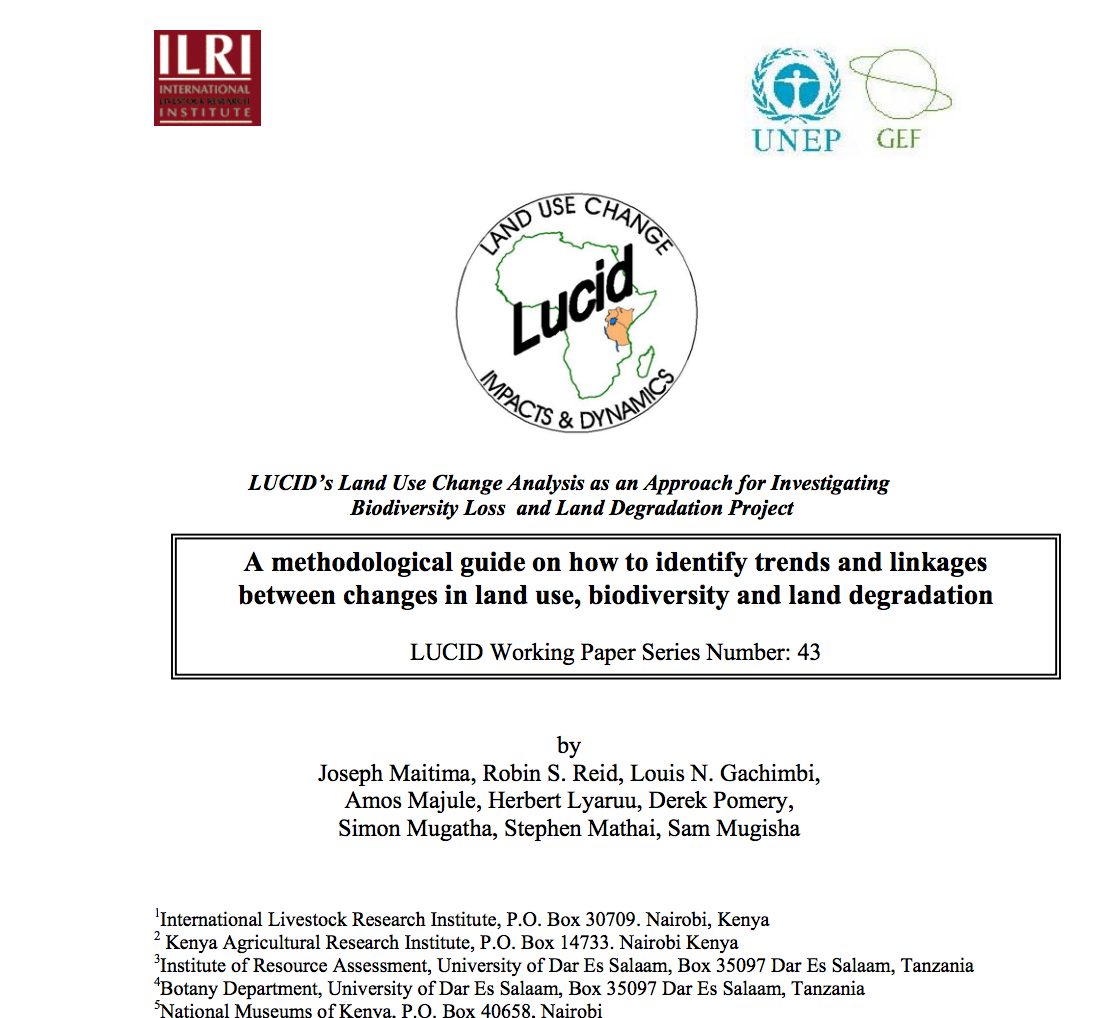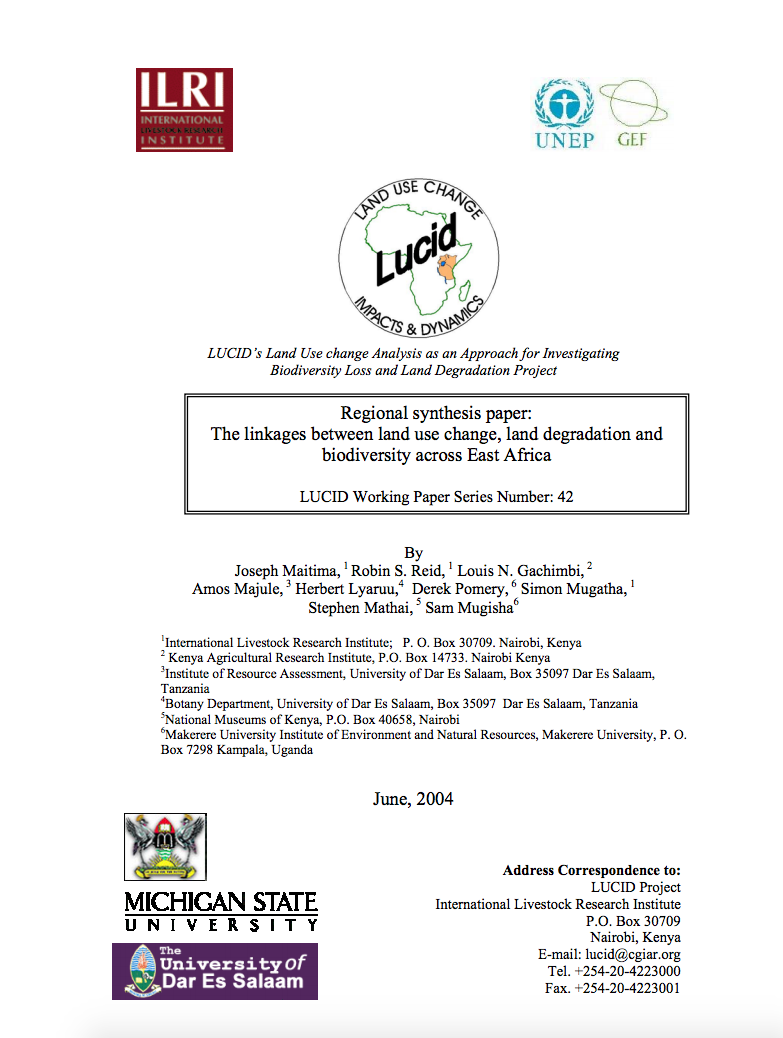Carbon sequestration in dryland soils
This publication reflects part of FAO's work on soil carbon sequestration within the framework of its programme on the integrated planning and management of land resources for sustainable rural development. The report presents a comprehensive analysis of the scientific aspects and potential for carbon sequestration in drylands – some of the most soil-degraded and impoverished regions of the world. It is based on case studies carried out across different land-use and managaement systems in several distinctive dryland areas.
A methodological guide on how to identify trends and linkages between changes in land use, biodiversity and land degradation
Land quality in the man-modified agricultural landscapes of eastern Africa has been shown to degrade over time, resulting in higher demands for farm inputs in order to sustain productivity. Loss of biodiversity has also been observed in all these areas of land use change. It has therefore become important to know how land use change contributes to land degradation and how land use change leads to biodiversity loss. This paper from the collaborative LUCID project describes a framework for the analysis between land use change, biodiversity loss and land degradation for the first time.
The linkages between land usage, land degradation and biodiversity across East Africa
This paper is a regional synthesis highlighting the linkages between land usage, land degradation and biodiversity across East Africa identified from research done over a 30 year period.
The linkages between land usage, land degradation and biodiversity across East Africa
This paper is a regional synthesis highlighting the linkages between land usage, land degradation and biodiversity across East Africa identified from research done over a 30 year period.
Policies for sustainable land management in the highlands of Tigray, Northern Ethiopia
Participants in this workshop reviewed and discussed findings from the research project‚ Policies for Sustainable Land Management in the Highlands of Tigray, Northern Ethiopia, begun in January 1998, and from other related research being conducted in the highlands of Tigray by Mekelle University and its collaborators.
Genetically modified food crops and their contribution to human nutrition and food quality
Ending hunger by 2050
"To end hunger and prevent the recurrence of famine and starvation, we need to take the following steps: invest in public health, child nutrition, education, women’s and girls’ social status, and other components of human capital; reform public institutions and create innovative funding and partnership arrangements; change government policies at all levels to be both pro-poor and pro-growth; increase funding for scientific and technological research to boost agricultural production and efficiency; and develop specific policies and institutions to deal with environmental degradation caused
Mettre fin a la famine en Afrique
Contrairement aux prévisions communément admises quant à l’aggravation du déclin économique de l’Afrique, une récente étude présente une vision alternative plus positive de l’avenir de ce continent. De nouveaux engagements politiques, une gestion du programme de développement sous égide africaine ainsi que l’accroissement de l’intérêt et des investissements dans les petites exploitations agricoles ont le potentiel d’arrêter, voire d’inverser la tendance spiroïdale de la famine, de la pauvreté, de la dégradation environnementale, des maladies et des guerres civiles.
Biology and establishment of mountain shrubs on mining disturbances in the Rocky Mountains, USA
The Rocky Mountains of the western United States contain many economically important natural resources. Increasing development of these resources has lead to land degradation, which often requires restoration efforts. A common type of disturbance in this region is mineral extraction and these activities often occur in zones of vegetation dominated by shrubs. These mined lands have proven to be particularly challenging to restore to native shrub cover.
Use of the partial nutrient budget as an indicator of nutrient depletion in the highlands of southwestern Uganda
Agricultural management has its roots in the manipulation of the system to optimise conditions for crop production. It is now widely recognised that this could result in land degradation with subsequent serious impact on crop productivity if the nutrient losses to the agricultural system are not replaced. A nutrient budget is an account of gains and losses of nutrients in an agricultural system, a tool that could be used to develop sound nutrient management and sustainable agriculture.
improved method for determination of Holocene coastline changes around two ancient settlements in southern Anatolia: a geoarchaeological approach to historical land degradation studies
Two well-known ancient sites in southern Anatolia were selected to investigate and quantify the impact of historical land degradation on the Mediterranean coast of Turkey. These sites are the Luwian settlements of Kelenderis (modern Aydıncık) and nearby Nagidos (Bozyazı), both in Mersin Province and both occupied since around 4000 BP. Changes in local climatic conditions over this period have produced variations in the rates of fluvial transport of sediment/soil from the hinterland into the relevant deltaic regions, thus influencing rates of coastal progradation and aggradation.









